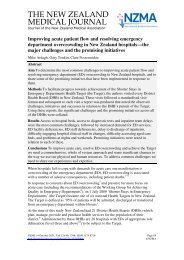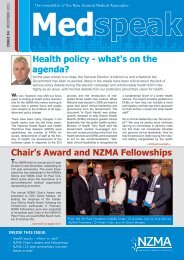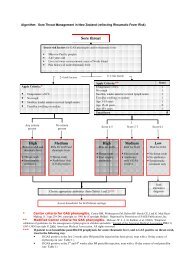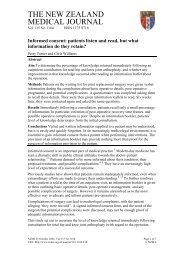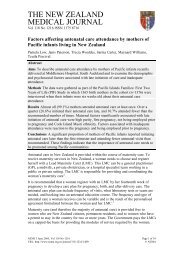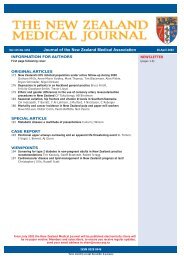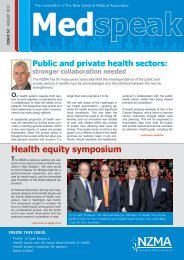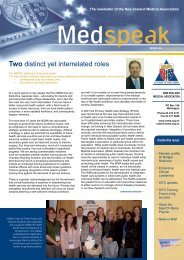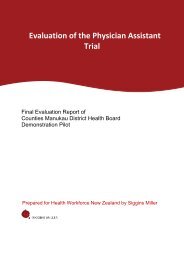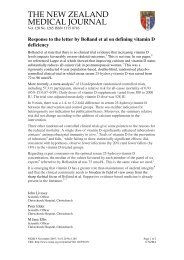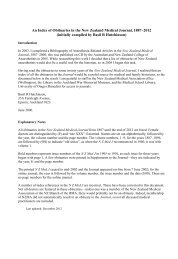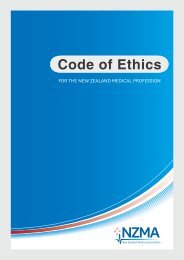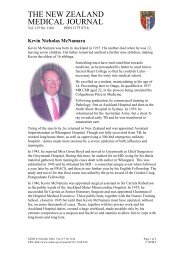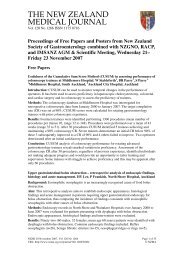THE NEW ZEALAND MEDICAL JOURNAL
THE NEW ZEALAND MEDICAL JOURNAL
THE NEW ZEALAND MEDICAL JOURNAL
You also want an ePaper? Increase the reach of your titles
YUMPU automatically turns print PDFs into web optimized ePapers that Google loves.
the degree of internal or external motivation, and the visibility of professional practice<br />
norms. 14<br />
Being a reflective practitioner also infers having the capacity to change. This requires<br />
not only accurate insight, but also motivation to improve. There is no doubt that<br />
OTDs are highly motivated as they have emigrated in the hope of a better life and<br />
have undertaken the Bridging Programme to prepare for NZREX. Yet when it came to<br />
supporting the usefulness of belonging to a peer group, some participants were<br />
unconvinced. 1 This could be because it was still a new concept and they could not yet<br />
see its value, or that it was uncomfortable and challenging for them, or that this<br />
component was inadequate for their needs.<br />
Some participants stated that they were more comfortable and confident working<br />
alone. In our experience, a small minority of participants lacked insight into their<br />
performance and hence were unable to take advantage of the intensive tuition in<br />
Professional Development provided by the Bridging Programme. As a result, they<br />
could not meet the standards required to pass.<br />
Training modules<br />
An important recommendation, arising from our experience in teaching OTDs, is that<br />
we design a system of re-training that takes into account the vastly different<br />
backgrounds and training requirements of immigrant doctors.<br />
Specifically, a system of modules could be developed that meets individual OTDs’<br />
needs. For example, almost all OTDs would require a module on Maori and Pacific<br />
health, and another on the ethical and legal environment in New Zealand. Many<br />
would need modules on the patient-centred style of consultation; some may need<br />
updates in particular specialty areas (e.g. paediatrics or obstetrics & gynaecology);<br />
while some may need only an orientation programme informing them about the<br />
New Zealand health system.<br />
A module-based programme would need additional work in the planning stage,<br />
especially in designing the more specialised modules. It might also be a little more<br />
complex to administer; but it might be well worth it in the long run.<br />
The way ahead<br />
It is clear, both from our own experience and from current research, that there needs<br />
to be a fuller assessment of OTDs’ learning needs 15 before they enter a re-training<br />
programme. For example, there needs to be a measure of English proficiency, set at a<br />
standard higher than it is currently, and appropriate to the medical setting.<br />
There is also a need to recruit the most appropriate candidates. It might be advisable<br />
to develop special tools to screen for those doctors best able to make the changes in<br />
behaviour required to practice in New Zealand. To this end, the Medical Council of<br />
New Zealand might consider developing a diagnostic interview, covering all aspects<br />
of the requirements for registration and practice in New Zealand. This would be a<br />
challenge. In addition to the established measures of clinical competence, it would be<br />
advantageous to have specific tools for measuring motivation, mood, learning<br />
behaviours and awareness of what others think. 14 We should also try to include a<br />
measure of capacity to change.<br />
NZMJ 29 July 2005, Vol 118 No 1219 Page 3 of 5<br />
URL: http://www.nzma.org.nz/journal/118-1219/1584/<br />
© NZMA



